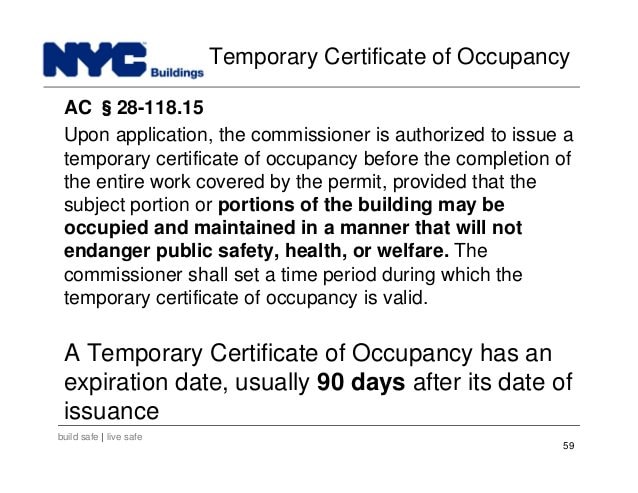Table of Contents Show
In the intricate world of New York City real estate, the significance of a Certificate of Occupancy (CO) cannot be overstated. Acting as a crucial regulatory document, the CO dictates a building’s legal use and permissible occupancy types. While the New York City Department of Buildings strongly advises against closing a deal until a permanent CO is secured, nuances exist, particularly in the case of new developments and pre-1938 constructions. It is common practice to proceed with closing arrangements when purchasing a new development condo based on the issuance of a Temporary Certificate of Occupancy (TCO).
Deciphering Certificates of OccupancyDeciphering Certificates of Occupancy
A building cannot welcome occupants without the blessing of the Department of Buildings in the form of a CO or Temporary Certificate of Occupancy (TCO). For existing structures or new constructions, a CO signifies compliance with a myriad of regulations encompassing construction standards, plumbing, electrical systems, elevator safety, and zoning ordinances. This document serves as a testament that all necessary inspections have been conducted, permits obtained, and violations rectified. To verify a property’s CO status, individuals can easily access the Buildings Information System website for pertinent information.
Temporary Solutions: Temporary Certificate of OccupancyTemporary Solutions: Temporary Certificate of Occupancy
In cases where a building is deemed safe for occupancy but minor issues linger, the Department of Buildings may issue a TCO. Valid for 90 days from issuance, a TCO provides a temporary green light while allowing for the resolution of outstanding concerns. However, it’s crucial to note that a TCO is temporary. Renewal options exist, but prudent caution is advised, especially for prospective buyers.
Proceeding with CautionProceeding with Caution
Despite the allure of swift closures, especially in the realm of new developments, exercising caution is paramount. The Department of Buildings underscores the importance of negotiating a closing contingent upon acquiring a final CO. Prospective buyers are encouraged to seek guidance from qualified professionals such as real estate attorneys and brokers to ascertain the remaining work and associated risks. This advice applies not only to individual unit buyers but also to cooperative and condominium purchasers.
Navigating the Closing ProcessNavigating the Closing Process
In the fast-paced world of real estate transactions, sponsors may exert pressure for prompt closures following the issuance of a TCO. Legally, sponsors possess the authority to close deals within 30 days post-TCO reception, subject to the state’s declaration of the offering plan’s effectiveness. To safeguard their interests, buyers can stipulate in contracts that developers assume responsibility for completing outstanding work and securing the final CO. Alternatively; buyers may request the establishment of an escrow fund to cover potential expenses associated with existing units.
Mitigating RisksMitigating Risks
The expiration of a TCO without renewal poses significant challenges for homeowners. Insurance coverage may become elusive, refinancing efforts complicated, and resale prospects jeopardized. Prudence dictates thorough due diligence and proactive measures to mitigate associated risks.
Navigating Legal NuancesNavigating Legal Nuances
While the acquisition of a CO signifies compliance with regulatory standards, it’s essential to delve deeper into the legal intricacies surrounding these documents. For instance, buildings constructed before 1938 may not require a CO unless significant changes in use, egress, or occupancy occur. In such cases, a Letter of No Objection serves as a testament to the building’s compliance with prevailing regulations.
Understanding Development DynamicsUnderstanding Development Dynamics
In the realm of new developments, the issuance of a TCO marks a pivotal milestone in the project’s lifecycle. Developers may be eager to close deals promptly following TCO receipt, seeking to expedite revenue generation and project completion. However, buyers must remain vigilant, ensuring that all necessary provisions are in place to safeguard their investment.
Engaging Qualified ProfessionalsEngaging Qualified Professionals
Navigating the complexities of COs demands the expertise of qualified professionals. Engineers, architects, and real estate attorneys play instrumental roles in conducting thorough due diligence, assessing potential risks, and safeguarding buyers’ interests. Their insights can prove invaluable in identifying potential pitfalls and negotiating favorable terms.
Final ThoughtsFinal Thoughts
In the dynamic landscape of New York City real estate, understanding the nuances of Certificates of Occupancy is indispensable. Whether navigating the complexities of new developments or venerable pre-1938 constructions, buyers must tread cautiously, ensuring that their investment aligns with regulatory requirements. By prioritizing due diligence, engaging qualified professionals, and negotiating diligently, individuals can navigate the intricacies of COs with confidence, safeguarding their interests in an ever-evolving urban landscape.








